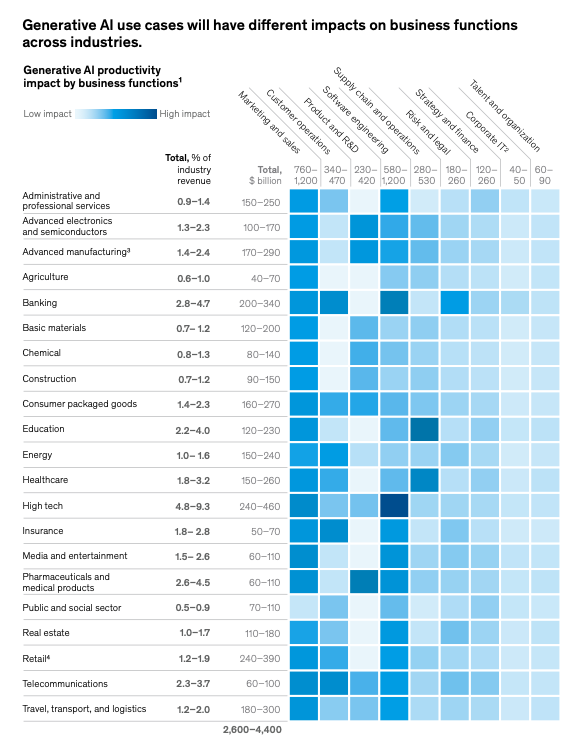McKinsey's Generative AI Report: 10 Key Takeaways
McKinsey recently released their generative AI report, outlining the potential value of AI across industries and functions. Here are the 10 key takeaways everyone should know.

Alex Banks
Building a better future with AI.

-
Last week McKinsey released their generative AI report.
— Alex Banks (@thealexbanks) June 22, 2023
Here are the 10 key takeaways everyone must know: -
1/ Value potential by industry
— Alex Banks (@thealexbanks) June 22, 2023
Generative AI has the potential to generate $4.4 trillion in value across industries.
• $460 billion in high tech. Predominant factor: software engineering
• $390 billion in retail. Predominant factor: marketing and sales pic.twitter.com/pjCyUCldwJ -
2/ Value potential by function
— Alex Banks (@thealexbanks) June 22, 2023
4 business functions account for ~75% of the total annual value of AI:
• Customer operations
• Marketing and sales
• Software engineering
• Research and development pic.twitter.com/hTaGsmzJkj -
3/ Key use cases
— Alex Banks (@thealexbanks) June 22, 2023
Banking→legacy code conversion
Retail→consumer research
Pharma→research and drug discovery
Example:
The University of Washington recently used machine learning for protein design.
It allowed them to tailor protein complexes to specific biological responses pic.twitter.com/oTas43ISOz -
4/ Achieving human-level performance
— Alex Banks (@thealexbanks) June 22, 2023
AI is expected to match median human performance and reach top-quartile human performance earlier than expected.
McKinsey's estimate for AI's natural language understanding:
2017 estimate: 2027
2023 analysis: 2023
Timelines are shortening. pic.twitter.com/EIUk5HHoVx -
5/ Automation is increasing
— Alex Banks (@thealexbanks) June 22, 2023
The total percentage of hours that could be automated by integrating technologies that exist today has increased from 50% to 60–70%.
The technical potential curve is steep because of the acceleration in generative AI’s natural-language capabilities. pic.twitter.com/CizF0gf7fX -
6/ Automation adoption has accelerated by a decade
— Alex Banks (@thealexbanks) June 22, 2023
McKinsey modelled adoption scenarios for the spent time on work activities reaching 50% automation:
2016 estimated midpoint was 2053
2023 estimated midpoint is 2045
This is an acceleration of almost a decade. pic.twitter.com/qYfmSOIsvV -
7/ Generative AI is likely to have the biggest impact on knowledge work
— Alex Banks (@thealexbanks) June 22, 2023
Particularly activities involving decision-making and collaboration.
This previously had the lowest potential for automation. pic.twitter.com/xZgI0hytFk -
8/ Automation has the greatest impact on higher-educated workers
— Alex Banks (@thealexbanks) June 22, 2023
Labour economists often note that the deployment of automation technologies has the most impact on low-skilled workers.
Generative AI has the opposite pattern—the greatest impact is with more-educated workers. pic.twitter.com/riu7aHdvxo -
9/ Displacing college degrees
— Alex Banks (@thealexbanks) June 22, 2023
High-wage knowledge work activities were previously considered immune from automation.
AI will challenge the attainment of a multiyear degree as an indicator of skill.
This could lead to a more skills-based approach to workforce development. pic.twitter.com/vRGUWLdIKL -
10/ Propelling higher productivity growth
— Alex Banks (@thealexbanks) June 22, 2023
Global economic growth was slower from 2012 to 2022 than in the two preceding decades.
Generative AI helps accelerate productivity growth and compensates for declining employment growth by automating individual work activities. pic.twitter.com/VVGelA5spF -
Don't just stay updated, stay ahead.
— Alex Banks (@thealexbanks) June 22, 2023
You can follow me @thealexbanks for more on AI.
If you liked this thread, you'll love the newsletter.
Subscribe here:https://t.co/Kre1Uawx3B -
Help everyone learn and retweet this thread: https://t.co/NqLPVQtUYy
— Alex Banks (@thealexbanks) June 22, 2023 -
Full report by McKinsey:https://t.co/tnOyZRQ2Vn
— Alex Banks (@thealexbanks) June 22, 2023
You can read more about AI protein design here:https://t.co/8tT9Qjg42b -
Writing this reminded me of Carl Icahn’s iconic story of his first activist investment.
— Alex Banks (@thealexbanks) June 23, 2023
He brought in a big consulting firm and asked if they could figure out what half the company did.
Carl ended up firing 12 floors of people 🤣https://t.co/OZ3HtBSie4
